英语学习计划安排表格
英语学习计划表 背诵默写单句子拓展词汇量
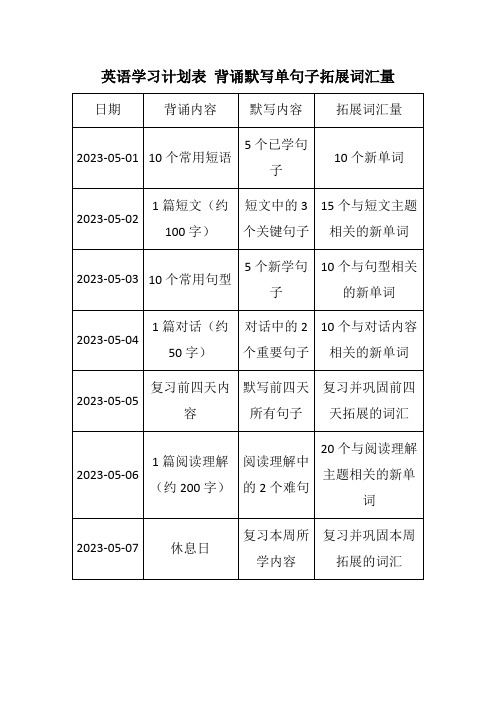
对话中的2个重要句子
10个与对话内容相关的新单词
2023-05-05
复习前四天内容
默写前四天所有句子
复习并巩固前四天拓展的词汇
2023-05-06
1篇阅读理解(约200字)
阅读理解中的2个难句
20个与阅读理解主题相关的新单词
2023-05-07
休息日
复习本周所学内容
复习并巩固本周拓展的词汇
英语学习计划表背诵默写单句子拓展词汇量
日期
背诵内容
默写内容
拓展词汇量
2023-05-01
10个常用短语
5个已学句子
1Hale Waihona Puke 个新单词2023-05-02
1篇短文(约100字)
短文中的3个关键句子
15个与短文主题相关的新单词
2023-05-03
10个常用句型
5个新学句子
10个与句型相关的新单词
2023-05-04
暑假英语学习计划表
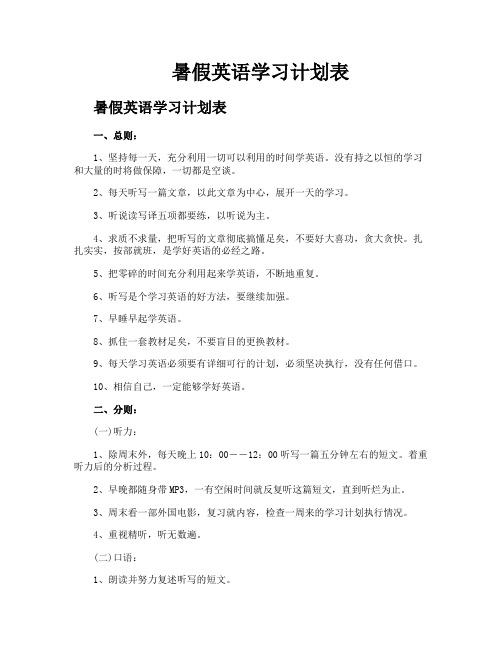
暑假英语学习计划表暑假英语学习计划表一、总则:1、坚持每一天,充分利用一切可以利用的时间学英语。
没有持之以恒的学习和大量的时将做保障,一切都是空谈。
2、每天听写一篇文章,以此文章为中心,展开一天的学习。
3、听说读写译五项都要练,以听说为主。
4、求质不求量,把听写的文章彻底搞懂足矣,不要好大喜功,贪大贪快。
扎扎实实,按部就班,是学好英语的必经之路。
5、把零碎的时间充分利用起来学英语,不断地重复。
6、听写是个学习英语的好方法,要继续加强。
7、早睡早起学英语。
8、抓住一套教材足矣,不要盲目的更换教材。
9、每天学习英语必须要有详细可行的计划,必须坚决执行,没有任何借口。
10、相信自己,一定能够学好英语。
二、分则:(一)听力:1、除周末外,每天晚上10:00――12:00听写一篇五分钟左右的短文。
着重听力后的分析过程。
2、早晚都随身带MP3,一有空闲时间就反复听这篇短文,直到听烂为止。
3、周末看一部外国电影,复习就内容,检查一周来的学习计划执行情况。
4、重视精听,听无数遍。
(二)口语:1、朗读并努力复述听写的短文。
2、每天坚持张嘴说,每周参加英语角。
3、注意在朗读过程中纠正发音。
(三)阅读:1、每周阅读一份英语报纸。
2、每次整理笔记。
(四)写译:1、争取把每天听写的短文都翻译,先英汉,再汉英。
2、注意整理笔记。
暑假英语学习计划表暑假来临,同学们通过一个学期的紧张学习,在英语知识及学习方法总结方面都有了一定的进步,初三暑期英语学习策略。
如果能够合理科学地利用暑假进行提升,就能为下一个阶段的学习积蓄力量,取得理想的阶段性胜利,从而增加自信,提高对英语学习的兴趣。
取得中考英语的胜利将是必然的结果。
在暑假期间我们该如何安排英语学习才能有效的提高兴趣以及成绩呢?从以下几个方面来思考,制定出适合自己的学习方案。
一、了解自己英语学习不可能一蹴而就,需要踏踏实实地学习和长时间的积累,不过在短时间内或者说一个学期的英语成绩对大家的心里影响也不可小觑,所以大家要对自己在班级中的成绩排名做到心中有数,大致知道自己处于上、中、下的哪个位置,以便于制定出适合自己的暑期学习方案。
高二英语期中后至期末学习计划安排
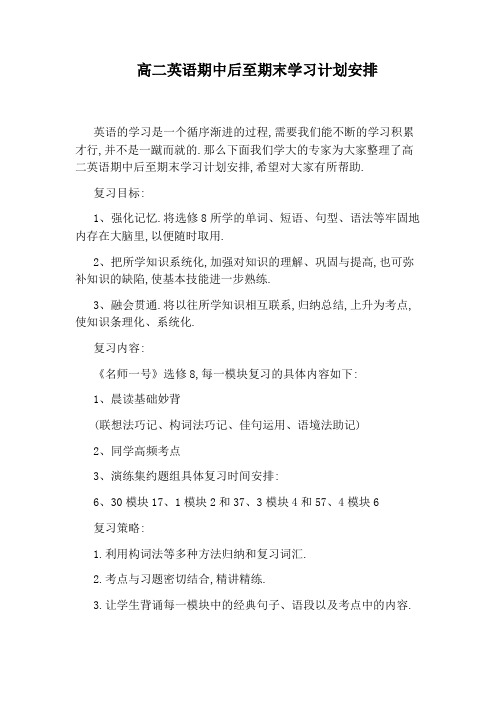
高二英语期中后至期末学习计划安排
英语的学习是一个循序渐进的过程,需要我们能不断的学习积累才行,并不是一蹴而就的.那么下面我们学大的专家为大家整理了高二英语期中后至期末学习计划安排,希望对大家有所帮助.
复习目标:
1、强化记忆.将选修8所学的单词、短语、句型、语法等牢固地内存在大脑里,以便随时取用.
2、把所学知识系统化,加强对知识的理解、巩固与提高,也可弥补知识的缺陷,使基本技能进一步熟练.
3、融会贯通.将以往所学知识相互联系,归纳总结,上升为考点,使知识条理化、系统化.
复习内容:
《名师一号》选修8,每一模块复习的具体内容如下:
1、晨读基础妙背
(联想法巧记、构词法巧记、佳句运用、语境法助记)
2、同学高频考点
3、演练集约题组具体复习时间安排:
6、30模块1
7、1模块2和37、3模块4和57、4模块6
复习策略:
1.利用构词法等多种方法归纳和复习词汇.
2.考点与习题密切结合,精讲精练.
3.让学生背诵每一模块中的经典句子、语段以及考点中的内容.
高二英语期中后至期末学习计划安排就是以上我们学大为大家分享的内容了,希望大家能根据这个制定出自己的额英语学习计划.。
英语学习计划安排表
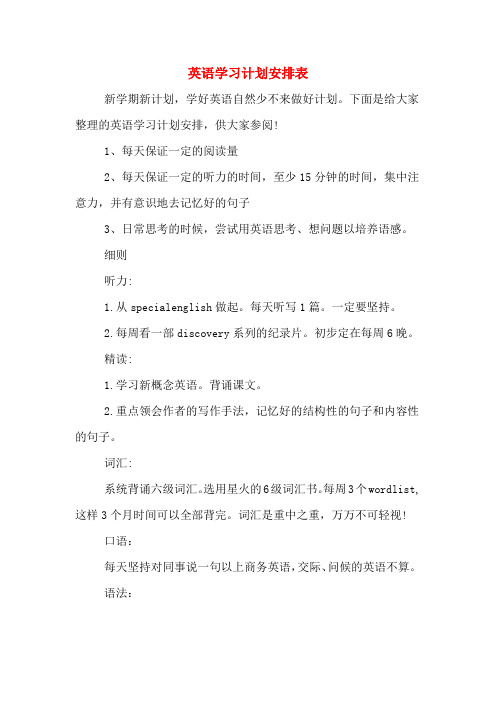
英语学习计划安排表新学期新计划,学好英语自然少不来做好计划。
下面是给大家整理的英语学习计划安排,供大家参阅!1、每天保证一定的阅读量2、每天保证一定的听力的时间,至少15分钟的时间,集中注意力,并有意识地去记忆好的句子3、日常思考的时候,尝试用英语思考、想问题以培养语感。
细则听力:1.从specialenglish做起。
每天听写1篇。
一定要坚持。
2.每周看一部discovery系列的纪录片。
初步定在每周6晚。
精读:1.学习新概念英语。
背诵课文。
2.重点领会作者的写作手法,记忆好的结构性的句子和内容性的句子。
词汇:系统背诵六级词汇。
选用星火的6级词汇书。
每周3个wordlist,这样3个月时间可以全部背完。
词汇是重中之重,万万不可轻视!口语:每天坚持对同事说一句以上商务英语,交际、问候的英语不算。
语法:主要还是靠使用中掌握,坚持写英语日记的话,会对语法和词汇都大有好处。
当然有一本语法书也是很重要的。
切忌不可使用文曲星,应该使用纸质英文词典。
每天计划早上:8:30-9:00(上班途中),在车上听BBC或中国国际广播电台的早间新闻。
中午:12:30-1:00,听ChanelV的英文歌。
下午:5:30-6:00(下班途中),在车上听BBC或中国国际广播电台的晚间新闻。
晚上:9:00-11:00,背单词,听听力,背课文,看语法。
听力可选择听4频道的英文新闻;大声朗读英文课文一篇。
每周计划周一:主要任务背单词周二:主要任务背新概念英语周三:主要任务复习语法周四:主要任务听听力周五:主要任务朗读新概念英语文章周日:自由安排学习英语必须下苦功夫,时间是最重要的。
周一、三、五1.每天早上6:00-7:30背课文(复习前天所学,要大声朗读)2.8:00--9:00在车上听磁带或看英文报。
3.12:00--13:00看网上的英语网站,你感兴趣的,好玩的,你能看明白的。
4.6:00--7:00听广播(英文),边听边记,将自己听到的记下来。
考研英语学习计划表

考研英语学习计划表考研英语学习计划表时光在流逝,从不停歇,我们的工作又进入新的阶段,为了在工作中有更好的成长,立即行动起来写一份计划吧。
计划怎么写才能发挥它最大的作用呢?下面是小编精心整理的考研英语学习计划表,欢迎阅读,希望大家能够喜欢。
考研英语学习计划表1准备阶段:现在-3月底1、考生首先要选择一套适合自己备考辅导书,词汇、真题,目前考研图书市场上书籍琳琅满目,考生一定要擦亮眼睛选择一套正版、权威、适合自己的书籍,才能更加有效的帮助考生提高正确率。
2、考生还要在准备阶段制定一套切实可行的计划,将各个月份的英语备考重点做一个详细的规划。
基础阶段:4-6月正所谓“得英语者得天下,得阅读者得英语”,在基础阶段,考生们要在复习词汇、语法的基础上开始着手真题的练习了。
阅读要一马当先,最先深入真题。
考英语二的考生,由于历年真题较少,可先完成英语一历年真题的阅读部分。
此阶段最好将20xx-20xx十年真题的阅读部分完成第一轮。
提高阶段:7-8月1、本阶段要重点记忆单词、巩固语法。
2、对真题,同样要对阅读部分进行具体研究,总结真题阅读中的考点、难点,对命题方向有所了解,在阅读中积极联想所背诵单词的含义,同时用阅读巩固单词的记忆,在暑假中完成阅读部分的第二轮练习。
强化阶段:9-10月1、按照计划继续完成单词的背诵,形成自己独特的记忆技巧,总结出以混淆、易出错的单词,方便阅读查看。
对于真题的研究,要在进行第二轮的阅读理解训练的前提下,增加翻译部分的训练。
2、值得注意的是,英语一、英语二翻译的难度不同,英语二考生在完成英语一翻译部分时还是以掌握知识点为主,不要在正确率上“较真”,可与英语二翻译真题穿插练习。
冲刺阶段:11-12月在11-12月份中,考研英语需要开始进行定量的模拟题训练,严格保证模拟时间与真正考研英语的考试时间相一致,在模拟练习中不翻阅资料,不给自己延长做题时间,严格要求自己。
考研英语的作文也要在此阶段进行重点训练,仔细研究范文,整理词汇运用、固定搭配及篇章结构的安排,坚持将作文训练落实到纸上。
英语每天的计划安排表

英语每天的计划安排表English Response:Morning:7:00 AM: Wake up, exercise, and shower (30 minutes)。
7:30 AM: Breakfast (30 minutes)。
8:00 AM: English study: Vocabulary and grammar review (60 minutes)。
9:00 AM: English study: Reading comprehension (60 minutes)。
Afternoon:12:00 PM: Lunch (60 minutes)。
1:00 PM: English study: Listening comprehension (60minutes)。
2:00 PM: English study: Speaking practice (60 minutes)。
Evening:6:00 PM: Dinner (60 minutes)。
7:00 PM: English study: Review and practice (60 minutes)。
8:00 PM: Free time (relaxation, hobbies)。
10:00 PM: Bedtime.Weekend:Saturday: Full day of English immersion (movies, podcasts, books)。
Sunday: Half-day of English study (conversation, writing)。
Additional Tips:Use a language learning app throughout the day for short bursts of practice.Surround yourself with English-speaking media and culture.Practice speaking English with a native speaker or language partner.Set realistic goals and track your progress to stay motivated.Be patient and persistent, as language learning takes time and effort.中文回答:早上:7:00 起床,锻炼,洗漱(30分钟)。
小学生学习计划表,语文数学英语综合劳动
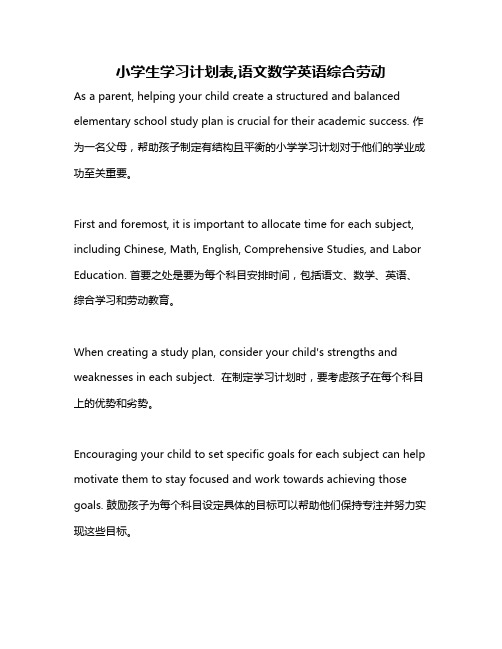
小学生学习计划表,语文数学英语综合劳动As a parent, helping your child create a structured and balanced elementary school study plan is crucial for their academic success. 作为一名父母,帮助孩子制定有结构且平衡的小学学习计划对于他们的学业成功至关重要。
First and foremost, it is important to allocate time for each subject, including Chinese, Math, English, Comprehensive Studies, and Labor Education. 首要之处是要为每个科目安排时间,包括语文、数学、英语、综合学习和劳动教育。
When creating a study plan, consider your child's strengths and weaknesses in each subject. 在制定学习计划时,要考虑孩子在每个科目上的优势和劣势。
Encouraging your child to set specific goals for each subject can help motivate them to stay focused and work towards achieving those goals. 鼓励孩子为每个科目设定具体的目标可以帮助他们保持专注并努力实现这些目标。
Incorporate breaks and leisure activities into the study plan to prevent burnout and promote a healthy work-life balance. 将休息和休闲活动融入学习计划中,以防止过度劳累并促进健康的工作与生活平衡。
春季学期英语计划表幼儿园中班

春季学期英语计划表幼儿园中班In the spring semester, the English plan for kindergarten middle class aims to provide a well-rounded English learning experience for young children.春季学期英语计划针对幼儿园中班的孩子们,旨在为他们提供全面的英语学习体验。
To achieve this, the plan includes a variety of activities such as songs, games, and storytelling, to make learning English fun and engaging for the children.为了实现这一目标,计划包括了各种活动,如歌曲、游戏和讲故事,以使孩子们乐于学习英语,保持积极性。
Apart from structured lessons, the plan also emphasizes the importance of creating an English-speaking environment within the classroom through daily routines and interactions.除了有结构的课程之外,计划还强调通过日常的例行公事和互动,在课堂内营造一个英语环境的重要性。
Furthermore, the plan includes regular assessments to track the progress of each child and tailor the teaching methods to suit their individual needs.此外,计划包括定期评估,以追踪每个孩子的进展,并根据他们的个人需求调整教学方法。
英语计划表文字内容

英语计划表文字内容English:The English study plan includes various components such as vocabulary building, grammar practice, reading comprehension exercises, speaking practice, listening exercises, and writing assignments. The vocabulary building section will involve learning new words through flashcards, word lists, and quizzes. Grammar practice will focus on reviewing important grammar rules, completing exercises, and practicing writing sentences using those rules. Reading comprehension exercises will include reading passages, answering questions, and summarizing main ideas. Speaking practice will involve participating in class discussions, giving presentations, and practicing pronunciation. Listening exercises will include listening to native English speakers, answering questions, and transcribing recordings. Writing assignments will focus on improving writing skills by practicing essay writing, email writing, and creative writing. The study plan will be structured with daily tasks, weekly goals, and monthly assessments to track progress and make adjustments as needed.中文翻译:英语学习计划包括诸如词汇积累、语法练习、阅读理解练习、口语练习、听力练习和写作作业等各种组成部分。
英语学习计划及课时安排
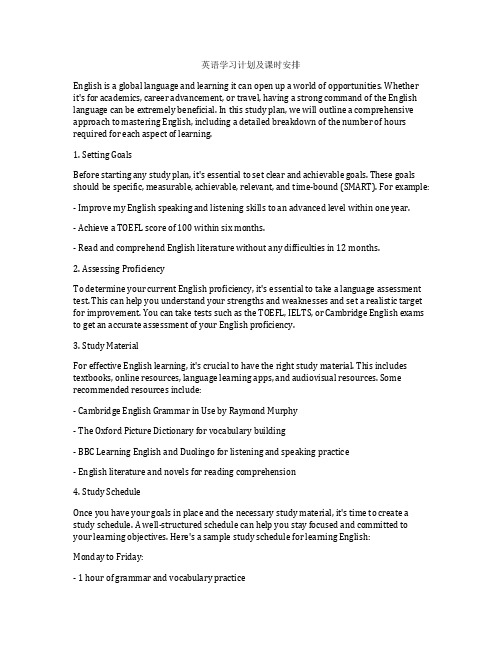
英语学习计划及课时安排English is a global language and learning it can open up a world of opportunities. Whetherit's for academics, career advancement, or travel, having a strong command of the English language can be extremely beneficial. In this study plan, we will outline a comprehensive approach to mastering English, including a detailed breakdown of the number of hours required for each aspect of learning.1. Setting GoalsBefore starting any study plan, it's essential to set clear and achievable goals. These goals should be specific, measurable, achievable, relevant, and time-bound (SMART). For example: - Improve my English speaking and listening skills to an advanced level within one year.- Achieve a TOEFL score of 100 within six months.- Read and comprehend English literature without any difficulties in 12 months.2. Assessing ProficiencyTo determine your current English proficiency, it's essential to take a language assessment test. This can help you understand your strengths and weaknesses and set a realistic target for improvement. You can take tests such as the TOEFL, IELTS, or Cambridge English exams to get an accurate assessment of your English proficiency.3. Study MaterialFor effective English learning, it's crucial to have the right study material. This includes textbooks, online resources, language learning apps, and audiovisual resources. Some recommended resources include:- Cambridge English Grammar in Use by Raymond Murphy- The Oxford Picture Dictionary for vocabulary building- BBC Learning English and Duolingo for listening and speaking practice- English literature and novels for reading comprehension4. Study ScheduleOnce you have your goals in place and the necessary study material, it's time to create a study schedule. A well-structured schedule can help you stay focused and committed to your learning objectives. Here's a sample study schedule for learning English:Monday to Friday:- 1 hour of grammar and vocabulary practice- 1 hour of listening and speaking practice- 1 hour of reading and comprehension- 30 minutes of writing practice- Total: 4.5 hours per daySaturday:- 1 hour of review and practice tests- 1 hour of speaking with a language partner or tutor- Total: 2 hoursSunday:- Rest day or optional review5. Focus Areas and Time Allocationa. Grammar and Vocabulary- Grammar is the foundation of any language, and mastering English grammar is crucial for clear and effective communication. Allocate at least 1-2 hours per day for grammar practice, including exercises and quizzes.- Vocabulary building is essential for expanding your language skills. Spend 1 hour per day learning and reviewing new words, idioms, and phrases.b. Listening and Speaking- Listening and speaking are key skills for communication in English. Dedicate 1-2 hours daily to listening to English podcasts, music, or news, and practice speaking with a language partner or tutor.c. Reading and Comprehension- Reading English literature, articles, and news can improve your comprehension and fluency. Spend 1-2 hours daily reading and comprehending various texts.d. Writing Practice- Writing is a skill that requires regular practice. Allocate 30 minutes to 1 hour per day for writing exercises, such as essays, emails, and creative writing.e. Review and Practice Tests- Regular review and practice tests are essential to gauge your progress. Set aside 1-2 hours on weekends for review and taking practice tests.6. Language Exchange and ImmersionTo further enhance your language skills, consider language exchange and immersion opportunities. This can include conversing with native English speakers, participating in language exchange programs, or immersing yourself in an English-speaking environment. Allocate 1-2 hours per week for language exchange and immersion activities.7. Progress TrackingIt's important to track your progress regularly to stay motivated and focused. Use tools like language learning apps, progress journals, or language assessment tests to monitor your improvement. Set short-term milestones, such as completing a textbook, achieving a specific TOEFL score, or reading a certain number of English books.8. Sustaining MotivationLearning a language requires consistent effort and dedication. To sustain motivation, it's important to set realistic expectations, celebrate small victories, seek support from language communities, and vary your study routine to avoid monotony.By following this comprehensive study plan, you can effectively enhance your English language skills and achieve your learning goals. Remember, consistency and perseverance are key to success in language learning. Good luck with your English language journey!。
优秀英语学习计划表6篇

优秀英语学习计划表6篇优秀英语学习计划表 (1) 早上6点-7点:一日之计在于晨,对一般人来说,疲劳已消除,头脑最清醒,体力亦充沛,是学习的黄金时段。
可安排对功课的全面复习。
早上8点-9点:据试验结果显示,此时人的耐力处于最佳状态,正是接受各种“考验”的好时间。
可安排难度大的攻坚内容。
上午9点-11点:试验表明这段时间短期记忆效果很好。
对“抢记”和马上要考核的东西进行“突击”,可事半功倍。
中午13点-14点:饭后人易疲劳,夏季尤其如此。
休息调整一下,养精蓄锐,以利再战。
最好休息,也可听轻音乐。
但午休切莫过长。
下午15点-16点:调整后精神又振,试验表明,此时长期记忆效果非常好。
可合理安排那些需“永久记忆”的东西。
傍晚17点-18点:试验显示这是完成复杂计算和比较消耗脑力作业的好时间。
这段时间适宜做复杂计算和费劲作业。
晚饭后:应根据各人情况妥善安排。
可分两三段来学习,语、数、外等文理科交叉安排;也可作难易交替安排优秀英语学习计划表 (2) 学英语是个长期过程,不能一蹴而就,因此制定一个切实有效的长期的学习计划是有必要的。
那么该怎么制定呢?首先就是要全面分析,正确认识自己。
要准确找出自己的长处和短处,以便明确自己学习的特点、发展的方向,发现自己在学习中可以发挥的最佳才能。
其次,要结合实际,确定目标。
订计划时,不要脱离学习的实际,目标不能定得太高或过低,要依据:(1)知识、能力的实际;(2)“缺欠”的实际;(3)时间的实际;(4)教学进度的实际,确定目标,以通过自己的努力能达到为宜。
第三,长计划要短安排。
要在时间上确定学习的远期目标、中期目标和近期目标。
在内容上确定各门功课和各项学习活动的具体目标。
学习目标可分为:(1)掌握知识目标;(2)培养能力目标;(3)掌握方法目标;(4)达到成绩(分数)目标。
长计划是指明确学习目标,确定学习的内容、专题,大致规划投入的时间;短安排是指具体的行动计划,即每周每天的具体安排和行动落实。
锻炼身体计划安排英语学习

锻炼身体计划安排英语学习Day 1: Monday- 30 minutes of cardio (running, cycling, or brisk walking)- 20 minutes of strength training (push-ups, squats, lunges, and planks)- 10 minutes of stretching and cool downDay 2: Tuesday- 45 minutes of yoga or Pilates- 15 minutes of core exercises (crunches, leg raises, and oblique twists)- 10 minutes of stretching and cool downDay 3: Wednesday- 30 minutes of interval training (sprints, high knees, and burpees)- 20 minutes of upper body strength training (dumbbell curls, shoulder presses, and tricep dips)- 10 minutes of stretching and cool downDay 4: Thursday- 45 minutes of low-impact exercise (swimming, dancing, or rowing)- 15 minutes of flexibility exercises (yoga poses, foam rolling, and dynamic stretches)- 10 minutes of stretching and cool downDay 5: Friday- 40 minutes of cardio kickboxing or HIIT workout- 20 minutes of lower body strength training (deadlifts, calf raises, and leg press)- 10 minutes of stretching and cool downDay 6: Saturday- Rest day or light activity (walking, hiking, or leisure cycling)Day 7: Sunday- 60 minutes of active recovery (yoga, foam rolling, or mobility exercises)English Learning Plan:Day 1: Monday- Read an article or a chapter from a book and take notes on vocabulary and key points.- Watch a TED Talk or a documentary in English and write a summary of the main ideas.- Listen to a podcast or news broadcast in English and make a list of new words and expressions.Day 2: Tuesday- Practice speaking English by having a conversation with a native speaker or language partner.- Complete a grammar exercise or worksheet to reinforce specific language rules.- Watch a movie or TV show in English with subtitles and take note of new phrases and idioms.Day 3: Wednesday- Write a short essay or journal entry in English to practice writing skills and express thoughts.- Learn new vocabulary by studying flashcards or using a vocabulary app.- Listen to English music and focus on understanding the lyrics and meanings of the songs. Day 4: Thursday- Engage in a language exchange with a native English speaker to practice speaking and listening.- Complete a reading comprehension exercise or practice reading aloud to improve pronunciation.- Participate in an online English course or workshop to expand language skills and knowledge.Day 5: Friday- Connect with a language tutor for personalized lessons and feedback on speaking, writing, and grammar.- Engage in a language exchange with a native English speaker to practice speaking and listening.- Immerse in English-speaking environments by attending events, meetups, or cultural activities.Day 6: Saturday- Review and revise previous learning materials, notes, and exercises to reinforce language retention.- Explore English-language websites, blogs, and forums to expose oneself to different styles of writing.Day 7: Sunday- Engage in conversation with native English speakers and practice using idioms, slang, and colloquial expressions.- Reflect on personal language learning journey and set new goals and objectives for improvement.- Take an English proficiency test or assessment to evaluate progress and identify areas of improvement.Both the exercise and English learning plans are designed to provide a balanced and holistic approach to health and personal development. By incorporating regular physical activity and language practice into one’s routine, individuals can enhance their physical fitness and cognitive abilities. It’s important to stay consistent, patient, and committed to the p lans in order to achieve long-term success and positive results.。
优秀英语学习计划表_英语学习计划

优秀英语学习计划表_英语学习计划英语学习计划表目标:提升英语读写能力,达到英语能力等级标准。
时间:18个月阶段一:第一周:建立学习目标,制定计划,为学习英语做好准备。
第二周至第四周:建立基础,学习英文字母,掌握基本语法,学习100个常用单词。
第五周至第八周:学习基础英语会话,听说读写并进,掌握基本语法,掌握200个常用单词。
阶段二:第九周至第十二周:巩固基础英语会话,学习生活场景下的英语,掌握300个常用单词。
第十三周至第十六周:继续巩固英语会话能力,学习商务场景下的英语,掌握400个常用单词。
阶段三:第十七周至第二十周:加强英语听力能力,学习基本听力技巧,提高听力理解能力,掌握500个常用单词。
第二十一周至第二十四周:提升英语口语能力,学习发音技巧,练习口语表达能力,巩固语法知识,掌握600个常用单词。
阶段四:第二十五周至第二十八周:提高英语写作水平,学习写作技巧,写作规范,掌握700个常用单词。
第二十九周至第三十二周:阅读提高,学习阅读技巧,增加阅读素材,巩固800个常用单词。
阶段五:第三十三周至第三十六周:复习预备阶段到现阶段所学知识,巩固口语和听力能力,掌握900个常用单词。
第三十七周至第四十周:模拟英语考试,检验学习成果,总结经验教训,为下一阶段做好准备。
阶段六:第四十一周至第四十四周:根据模拟考试情况调整学习重点,强化薄弱环节。
第四十五周至第四十八周:复习所有知识点,做练习题和模拟考试。
阶段七:第四十九周至第五十二周:备战正式英语考试,复习所有知识点,做练习题和模拟考试,增强信心。
总结:以上是18个月的英语学习计划表,每个阶段根据不同的学习内容和学习目标进行安排和调整。
为了达成学习目标,还需要日常坚持学习英语,看英语电影,听英语讲座,多与英语母语人士交流等。
坚持下去,我相信一定能达成自己的英语学习目标。
英语学习计划表格(完整版)

计划编号:YT-FS-4632-10英语学习计划表格(完整版)According To The Actual Situation, Through Scientific Prediction, Weighing The Objective Needs And Subjective Possibilities, The Goal To Be Achieved In A Certain Period In The Future Is Put Forward深思远虑目营心匠Think Far And See, Work Hard At Heart英语学习计划表格(完整版)备注:该计划书文本主要根据实际情况,通过科学地预测,权衡客观的需要和主观的可能,提出在未来一定时期内所达到的目标以及实现目标的必要途径。
文档可根据实际情况进行修改和使用。
词汇:其实每天不用背太多,20--30个就差不多了,但是重要的是要重复地去背,比如第一天背的25个单词,三天后至少要重新读上几遍熟悉一下,这样才能得到巩固。
单词这个东西,其实都差不多,因为也不知道楼主对自己英语等级的需要,所以也不好说具体。
如果楼主不是针对考试的学习英语的话,不要纠结于四六级什么的,好用广泛点的词汇会好一点。
听力:听力在高中时期要求不高,过了高中之后其实该炼的是精听。
最好的是听新闻,voa,bbc之类的英美新闻最好的。
训练自己精听的能力,就是边听边默写。
一开始的时候会很吃力,但是一段时间的坚持效果会很好的,对自己的听力帮助不是一般的好。
每天一篇足矣,但是需要楼主坚持。
口语:口语首先一部分是建立在听力上的。
其次就是要大胆开口了。
在新东方学习一般都会有比较多的口语练习机会,楼主好好把握先。
好好注意自己的口音,这个是需要模仿的,常看美剧是个不错的方法,比较生活化。
跟读以及音调的学习很重要,挺多了自己对口音会有一定的理解。
这个具体方案比较难说,因为不知道楼主的环境怎么样,如果周围有个伴的话每天一到两个小时,就像平常聊天一样,熟悉一下说英语的环境是不错的。
英语学习计划阶段安排

英语学习计划阶段安排Stage 1: Setting Goals and Assessing Current LevelTo start my English learning journey, I need to first set clear goals for what I want to achieve and assess my current level of English proficiency. I will start by listing out my short-term and long-term goals for learning English, such as improving my speaking, writing, listening, and reading skills, as well as passing a specific English exam or becoming fluent in the language. I will also assess my current level of English by taking a proficiency test or evaluating my skills in different areas of the language.Stage 2: Creating a Study ScheduleAfter setting my goals and assessing my current level, I will create a study schedule that aligns with my goals and fits into my daily routine. I will allocate specific study times for different language skills, such as speaking, writing, listening, and reading, and include time for vocabulary and grammar practice. I will also schedule regular review sessions to consolidate my learning and track my progress over time.Stage 3: Finding Suitable Learning MaterialsTo support my language learning, I will find suitable materials that cater to my current level and learning objectives. This could include textbooks, online courses, language-learning apps, podcasts, videos, and other resources. I will also seek out opportunities to practice English in real-life situations, such as joining conversation groups, finding a language exchange partner, or engaging in English-speaking activities.Stage 4: Practicing Speaking and ListeningImproving my speaking and listening skills will be a key focus of my English learning plan. I will practice speaking English regularly by engaging in conversations with native speakers, recording myself speaking, and participating in speaking practice sessions. I will also listen to a variety of English audio materials, such as podcasts, news broadcasts, and speeches, to improve my listening comprehension and pronunciation.Stage 5: Enhancing Reading and Writing SkillsIn addition to speaking and listening, I will work on enhancing my reading and writing skills in English. I will read a range of English texts, including books, articles, and essays, to expand my vocabulary and improve my reading comprehension. I will also practice writing in English by keeping a journal, writing essays, and seeking feedback on my written work to refine my grammar and style.Stage 6: Building Vocabulary and Grammar KnowledgeTo strengthen my language skills, I will focus on building my vocabulary and grammar knowledge in English. I will use flashcards, vocabulary lists, and mnemonic techniques tomemorize new words and phrases, as well as learn and review grammar rules. I will also practice using new vocabulary and grammar structures in context through speaking and writing exercises.Stage 7: Seeking Feedback and SupportThroughout my English learning journey, I will seek feedback from teachers, language partners, and native speakers to help me identify areas for improvement and track my progress. I will also seek out support from language learning communities, online forums, and study groups to stay motivated and exchange tips and resources with fellow learners.Stage 8: Assessing Progress and Adjusting GoalsAs I progress through my English learning plan, I will regularly assess my progress and adjust my goals and study schedule as needed. I will use proficiency tests, self-assessments, and feedback from others to gauge my language skills and determine areas for improvement. I will also celebrate my achievements and use any setbacks as learning opportunities to further refine my language learning strategies.Stage 9: Reaching Fluency and BeyondUltimately, my goal is to reach fluency in English and continue to use the language in various personal, academic, and professional contexts. I will continue to seek out opportunities for immersion, authentic practice, and exposure to English in order to maintain and further develop my language skills. I will also consider taking advanced courses, pursuing certification, and engaging in more challenging language activities to continue my growth as an English language learner.In conclusion, this English learning plan outlines the steps I will take to achieve my language learning goals and improve my English proficiency. By setting clear objectives, creating a structured study schedule, and seeking out resources and support, I am confident that I will make significant progress in my English learning journey. With dedication, perseverance, and a growth mindset, I look forward to becoming a confident and proficient English speaker in the near future.。
初中英语学习应该如何安排时间?
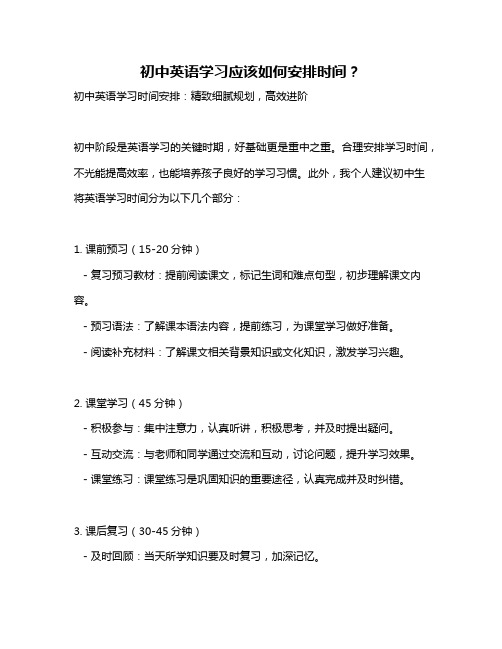
初中英语学习应该如何安排时间?初中英语学习时间安排:精致细腻规划,高效进阶初中阶段是英语学习的关键时期,好基础更是重中之重。
合理安排学习时间,不光能提高效率,也能培养孩子良好的学习习惯。
此外,我个人建议初中生将英语学习时间分为以下几个部分:1. 课前预习(15-20分钟)- 复习预习教材:提前阅读课文,标记生词和难点句型,初步理解课文内容。
- 预习语法:了解课本语法内容,提前练习,为课堂学习做好准备。
- 阅读补充材料:了解课文相关背景知识或文化知识,激发学习兴趣。
2. 课堂学习(45分钟)- 积极参与:集中注意力,认真听讲,积极思考,并及时提出疑问。
- 互动交流:与老师和同学通过交流和互动,讨论问题,提升学习效果。
- 课堂练习:课堂练习是巩固知识的重要途径,认真完成并及时纠错。
3. 课后复习(30-45分钟)- 及时回顾:当天所学知识要及时复习,加深记忆。
- 巩固练习:做课本练习和课外练习,确保知识点完全掌握。
- 查漏补缺:根据学习中遇到的问题,及时查阅书籍或向老师请教。
4. 英语阅读(30-45分钟)- 泛读:选择合适自身水平的英语读物,如英文绘本、小说、杂志等,学习积累词汇和语感。
- 精读训练:选择一篇英语文章进行精读,分析句子结构,学习词汇和语法,提升理解能力。
- 记录生词:将阅读过程中遇到的生词记录下来,并定期检查复习,扩充词汇量。
5. 英语听力训练(30-45分钟)- 坚持听力训练:选择适合的英语听力材料,坚持每天听,提升听力水平。
- 精听练习:针对一段音频,逐句理解,提高细节捕捉能力。
- 泛听训练:选择感兴趣的主题,通过泛听,积累听力素材和语感。
6. 英语口语练习(20-30分钟)- 模仿练习:模仿英语教材或音频中的发音,每天练习口语表达。
- 对话练习:与同学或朋友进行英语对话练习,提升口语流利度。
- 自主练习:利用手机APP或线上平台,进行英语口语练习,增强自信。
7. 专项训练(30-60分钟/周)- 词汇训练:制定词汇学习计划,通过单词记忆和练习。
一个月英语学习计划_
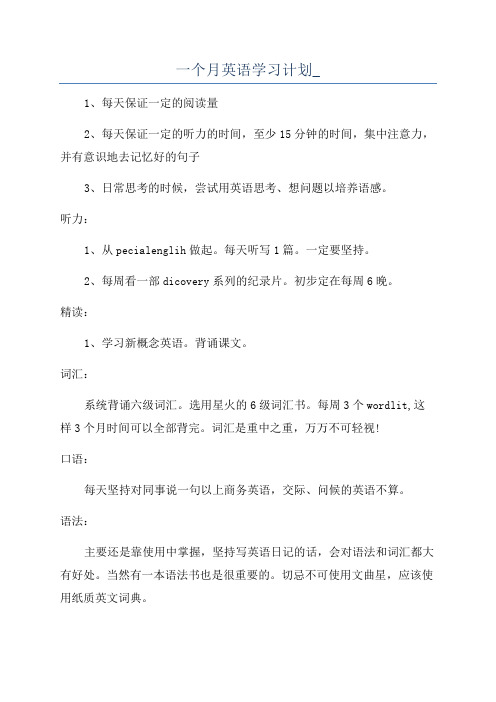
一个月英语学习计划_1、每天保证一定的阅读量2、每天保证一定的听力的时间,至少15分钟的时间,集中注意力,并有意识地去记忆好的句子3、日常思考的时候,尝试用英语思考、想问题以培养语感。
听力:1、从pecialenglih做起。
每天听写1篇。
一定要坚持。
2、每周看一部dicovery系列的纪录片。
初步定在每周6晚。
精读:1、学习新概念英语。
背诵课文。
词汇:系统背诵六级词汇。
选用星火的6级词汇书。
每周3个wordlit,这样3个月时间可以全部背完。
词汇是重中之重,万万不可轻视!口语:每天坚持对同事说一句以上商务英语,交际、问候的英语不算。
语法:主要还是靠使用中掌握,坚持写英语日记的话,会对语法和词汇都大有好处。
当然有一本语法书也是很重要的。
切忌不可使用文曲星,应该使用纸质英文词典。
早上:8:30-9:00(上班途中),在车上听BBC或中国国际广播电台的早间新闻。
中午:12:30-1:00,听ChanelV的英文歌。
下午:5:30-6:00(下班途中),在车上听BBC或中国国际广播电台的晚间新闻。
晚上:9:00-11:00,背单词,听听力,背课文,看语法。
听力可选择听4频道的英文新闻;大声朗读英文课文一篇。
每周计划周一:主要任务背单词周二:主要任务背新概念英语周三:主要任务复习语法周四:主要任务听听力周五:主要任务朗读新概念英语文章周六:主要任务看一部dicovery系列的纪录片,英文字幕或无字幕周日:自由安排听:每天听一套听力,基础较差的话,从慢速VOA做起,我推荐的网站是某某某某某某上面有非常非常丰富的听力资源。
听得时候一定要集中精力,不能这边听着听力,心里却在想着别的事情,那样毫无效果。
而且要力争全部听懂,刚开始听不懂的话,先听几遍再看着字幕听,看完字幕,再好好听几遍。
为什么这样重复呢只有当一个单词,你听了好多遍之后,你才能在下一次听到它的时候,一下子反应过来。
说:口语是一件说难也难,说轻松也很轻松的事情。
学习计划表格

晚辅导一 1.英语课文回归+背诵2.英语预习3英语日记 晚辅导二 1.回顾各科知识点2数学作业3,化学作业4.语文作业5.物理作业 周五 同周一
周六
同周一 8:40 1完成所有剩余作业 9:30 网上阅读新闻 10:00 阅读中文或者英文杂志
周日
8:00 1.阅读网上新闻 8:20 1.数学网络资源学习 休息 2.语文网络资源学习 休息 3.物理网络资源学习 4.休息 下午 1.英语网络资源 2.休息 3.化学网络资源 休息
周一
自习一 自习二
学习计划 1,写一天的各科回顾表2,英语背诵3.英语作业 1,看各科笔记2,做数学作业3,语文作业
周二 周三 周四
晚辅导一 1.物理作业2.化学作业3。预习英语课文 晚辅导二 1.数学练习题+数学预习2.化学练习题+化学预习3.物理练习+物理预习 同周一 同周一 自习一 1.写一天的回顾表2.英语背诵单词(约20分钟)3.英语作业
19:00 1各科练习题2预习3各科复习 如果自习课中,有英文电影鉴赏,或英语加课,时间表时间一次向下推迟
一次向下推迟,(以完成作业为主)
制定英语学习计划表的时间
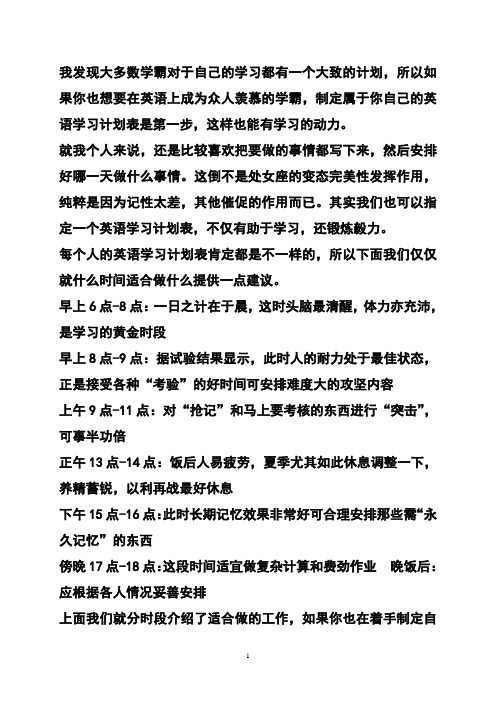
我发现大多数学霸对于自己的学习都有一个大致的计划,所以如果你也想要在英语上成为众人羡慕的学霸,制定属于你自己的英语学习计划表是第一步,这样也能有学习的动力。
就我个人来说,还是比较喜欢把要做的事情都写下来,然后安排好哪一天做什么事情。
这倒不是处女座的变态完美性发挥作用,纯粹是因为记性太差,其他催促的作用而已。
其实我们也可以指定一个英语学习计划表,不仅有助于学习,还锻炼毅力。
每个人的英语学习计划表肯定都是不一样的,所以下面我们仅仅就什么时间适合做什么提供一点建议。
早上6点-8点:一日之计在于晨,这时头脑最清醒,体力亦充沛,是学习的黄金时段
早上8点-9点:据试验结果显示,此时人的耐力处于最佳状态,正是接受各种“考验”的好时间可安排难度大的攻坚内容
上午9点-11点:对“抢记”和马上要考核的东西进行“突击”,可事半功倍
正午13点-14点:饭后人易疲劳,夏季尤其如此休息调整一下,养精蓄锐,以利再战最好休息
下午15点-16点:此时长期记忆效果非常好可合理安排那些需“永久记忆”的东西
傍晚17点-18点:这段时间适宜做复杂计算和费劲作业晚饭后:应根据各人情况妥善安排
上面我们就分时段介绍了适合做的工作,如果你也在着手制定自
己的英语学习计划表,也可以参考一下上面的材料。
当然,你也可以根据自己的学习习惯来制定,就像我本身就是夜猫子型人类,可以熬夜但是就是没法早起。
上面的只是一个参考而已。
- 1、下载文档前请自行甄别文档内容的完整性,平台不提供额外的编辑、内容补充、找答案等附加服务。
- 2、"仅部分预览"的文档,不可在线预览部分如存在完整性等问题,可反馈申请退款(可完整预览的文档不适用该条件!)。
- 3、如文档侵犯您的权益,请联系客服反馈,我们会尽快为您处理(人工客服工作时间:9:00-18:30)。
日期
时间
任务内容
完成情况(打
听(内容与数量)
读(内容与数量)
听写
复习内容
课文
单词
日期
时间
任务内容
完成情况(打
“√”或
“×”)
未完成的原因
家 长 反馈登记
听(内容与数量)
读(内容与数量)
听写
复习内容
课文
单词
日期
时间
任务内容
完成情况(打
“√”或
“×”)
未完成的原因
家 长 反馈登记
听(内容与数量)
读(内容与数量)
听写
复习内容
课文
单词
